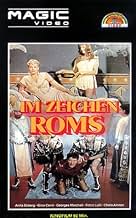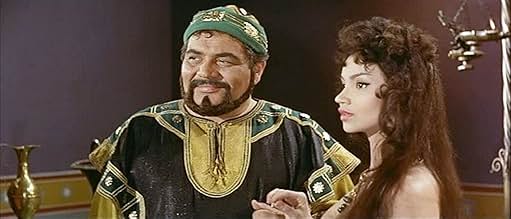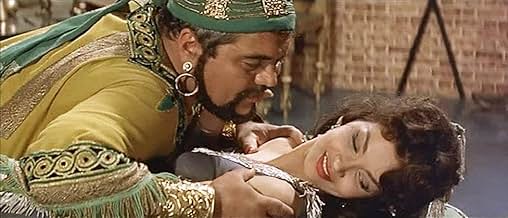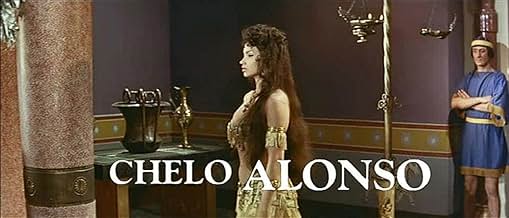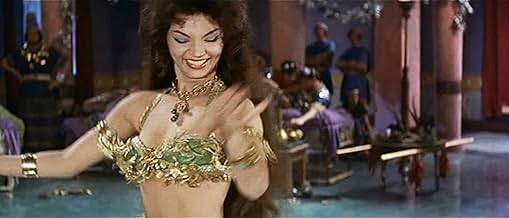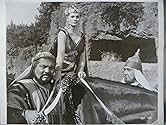Aggiungi una trama nella tua linguaZenobia, Queen of Palmyra, revolts against Rome and defeats the Roman troops - but she makes a big mistake when she falls in love with enemy officer Marco Valerio.Zenobia, Queen of Palmyra, revolts against Rome and defeats the Roman troops - but she makes a big mistake when she falls in love with enemy officer Marco Valerio.Zenobia, Queen of Palmyra, revolts against Rome and defeats the Roman troops - but she makes a big mistake when she falls in love with enemy officer Marco Valerio.
- Regia
- Sceneggiatura
- Star
Relja Basic
- Un soldato
- (non citato nei titoli originali)
Angelo Casadei
- Il generale
- (non citato nei titoli originali)
Aristide Catoni
- Un senatore
- (non citato nei titoli originali)
Arturo Dominici
- Un ufficiale di Zenobia
- (non citato nei titoli originali)
Recensioni in evidenza
Made at a time when the popularity of the Sword and Sandal sub-genre was at its height, before giving way to the Spaghetti Western, this is a rare example of romance and court intrigue taking precedence over mindless, muscle bound heroics.
At one would expect it plays fast and loose with historical fact for although Queen Zenobia was defeated by the Romans and her life spared by Emperor Aurelian, there is no record anywhere of a relationship with a Roman General whilst the makers have gone so far as to give him the name of Marcus Valerius whose military exploits took place a century later!
The film's poster promises 'a wondrous spectacle bigger than anything you've seen before' which certainly applies to Anita Ekberg's chest whilst the exotic Chela Alonso, affectionately known as the Cuban H-Bomb, performs one of her hoochie-coochie dances guaranteed to quicken the pulse and send a rush of blood to the corpora cavernosa.
The film itself is something of a hotchpotch and betrays the input of various contributors. Credited director Guido Brignone became ill during production, fatally as it turned out so Riccardo Freda and a certain Michelangelo Antonioni were drafted in whilst the cinematography by uncredited Mario Bava is evident, especially in the dungeon scenes. Heaven only knows which segments Antonioni directed but there is no doubt that Freda was responsible for the climactic battle scene which will have animal rights activists foaming at the mouth. Credited composer Angelo Lavagnino provides a truly magnificent score.
The production is certainly well mounted and lavishly decorated whilst the version I saw has mercifully been spared the dreaded mid-Atlantic dubbing with Ekberg's Zenobia and Aurelius of Georges Marchal voiced by the ubiquitous Lydia Simoneschi and Emilio Cigoli.
Zenobia was a fascinating woman and by the standards of her time an enlightened ruler and one would hope that one day a film will emerge that will do her justice but that alas hardly seems likely.
At one would expect it plays fast and loose with historical fact for although Queen Zenobia was defeated by the Romans and her life spared by Emperor Aurelian, there is no record anywhere of a relationship with a Roman General whilst the makers have gone so far as to give him the name of Marcus Valerius whose military exploits took place a century later!
The film's poster promises 'a wondrous spectacle bigger than anything you've seen before' which certainly applies to Anita Ekberg's chest whilst the exotic Chela Alonso, affectionately known as the Cuban H-Bomb, performs one of her hoochie-coochie dances guaranteed to quicken the pulse and send a rush of blood to the corpora cavernosa.
The film itself is something of a hotchpotch and betrays the input of various contributors. Credited director Guido Brignone became ill during production, fatally as it turned out so Riccardo Freda and a certain Michelangelo Antonioni were drafted in whilst the cinematography by uncredited Mario Bava is evident, especially in the dungeon scenes. Heaven only knows which segments Antonioni directed but there is no doubt that Freda was responsible for the climactic battle scene which will have animal rights activists foaming at the mouth. Credited composer Angelo Lavagnino provides a truly magnificent score.
The production is certainly well mounted and lavishly decorated whilst the version I saw has mercifully been spared the dreaded mid-Atlantic dubbing with Ekberg's Zenobia and Aurelius of Georges Marchal voiced by the ubiquitous Lydia Simoneschi and Emilio Cigoli.
Zenobia was a fascinating woman and by the standards of her time an enlightened ruler and one would hope that one day a film will emerge that will do her justice but that alas hardly seems likely.
Sign of the Gladiator was the first Italian epic to be released by American International Pictures. In 1959 their co-founders James H. Nicholson and Samuel Z. Arkoff took careful note how arch rival Joe Levine had purchased the Steve Reeves epic Hercules for just 100,000 dollars and then made millions. So, Jim and Sam picked up another Reeves winner, Goliath and the Barbarians, plus what was to become their first Italian offering, At the Sign of Rome.
Although this one doesn't have a man with a big chest, it makes up for it with a woman of similar attributes. Anita Ekberg plays the Queen of the desert, Xenobia (spelled with an "X" in the AIP credits), and the Italian costume designers were clearly under orders to ensure that her 40-inch bosom receives maximum uncoverage. The off-the-shoulder black evening gown that she seductively wears when arraigned before the Roman Senate could well be the same dress she wore in La Dolce Vita, made the same year. For younger viewers there is plenty of action and sword play, and the battle scenes were possibly one of the first occasions that stunt men allowed themselves to be set on fire. The hero suffers a spear straight to the chest, but in true western style he's as right as rain a few scenes later.
AIP decided that Sign of the Gladiator would make a more exciting title than At the Sign of Rome, even though there wasn't a single gladiator in sight. This difficulty was solved by re-writing the opening narration in which we are told that officers and generals of the Roman army were often recruited from the ranks of gladiators and that the foremost of the ex-gladiators was chosen to lead the army against Xenobia's hordes. Unfortunately, anyone who misses the opening narration will be waiting 85 minutes for a gladiator who never shows up. New York-based Titra Sound, regarded as the best dubbing company of all time, supply the English narration and dialogue, spoken by legendary voice actors George Gonneau, Peggy Lobbin and Norman Rose.
For the music score AIP would frequently bring in Les Baxter to entirely re-score the film from beginning to end. However, for Sign of the Gladiator AIP retained the original score by Lavagnino, except for the opening and closing titles which were re-shot with fresh footage. For the main title we see a scantily-clad showgirl dancing round a flaming altar, accompanied by Lavagnino's eerie music from the scene where the hero is tortured by thirst in the desert. To accompany the end title AIP made the bold (though hardly artistic) decision to finish with a pop song. "Xenobia" was composed by future film music giant Dominic Frontiere, with lyrics by Milton Raskin. The vocalist was the dependable Bill Lee who the previous year was chosen to dub the singing voice of John Kerr in South Pacific. American International Records released "Xenobia" as a single (AIR 501), but by way of an in-house joke named the backing group as the "Al Simms Sextet." (Simms was a senior executive at AIP and in charge of the music department). Milton Raskin had an unenviable task in devising pop lyrics for an Italian epic, but this is what he came up with: "Xenobia, lovely as the night / Eyes of misty light / Holding me close to you / Xenobia, lips of flame and fire / Burning with desire / More than I ever knew / Xenobia, hear me call to you from afar / I will go wherever you are / Will you open your heart? / For this I know – I am yours if you will command / Take my arm and you'll understand / What I knew from the start / Xenobia, do you lead me on? / Will my dream be gone? / Will it fade in the blue above? / Be mine alone, Xenobia, my love ."
This film may have started out as a serious historical exercise, but by the time Miss Ekberg and AIP had finished, it was a fun entertainment movie for all the family .and highly enjoyable. More importantly, the release made a healthy profit for AIP who were then able to buy up over 50 other Italian epics, many of them going straight to another company venture -- American International Television.
Although this one doesn't have a man with a big chest, it makes up for it with a woman of similar attributes. Anita Ekberg plays the Queen of the desert, Xenobia (spelled with an "X" in the AIP credits), and the Italian costume designers were clearly under orders to ensure that her 40-inch bosom receives maximum uncoverage. The off-the-shoulder black evening gown that she seductively wears when arraigned before the Roman Senate could well be the same dress she wore in La Dolce Vita, made the same year. For younger viewers there is plenty of action and sword play, and the battle scenes were possibly one of the first occasions that stunt men allowed themselves to be set on fire. The hero suffers a spear straight to the chest, but in true western style he's as right as rain a few scenes later.
AIP decided that Sign of the Gladiator would make a more exciting title than At the Sign of Rome, even though there wasn't a single gladiator in sight. This difficulty was solved by re-writing the opening narration in which we are told that officers and generals of the Roman army were often recruited from the ranks of gladiators and that the foremost of the ex-gladiators was chosen to lead the army against Xenobia's hordes. Unfortunately, anyone who misses the opening narration will be waiting 85 minutes for a gladiator who never shows up. New York-based Titra Sound, regarded as the best dubbing company of all time, supply the English narration and dialogue, spoken by legendary voice actors George Gonneau, Peggy Lobbin and Norman Rose.
For the music score AIP would frequently bring in Les Baxter to entirely re-score the film from beginning to end. However, for Sign of the Gladiator AIP retained the original score by Lavagnino, except for the opening and closing titles which were re-shot with fresh footage. For the main title we see a scantily-clad showgirl dancing round a flaming altar, accompanied by Lavagnino's eerie music from the scene where the hero is tortured by thirst in the desert. To accompany the end title AIP made the bold (though hardly artistic) decision to finish with a pop song. "Xenobia" was composed by future film music giant Dominic Frontiere, with lyrics by Milton Raskin. The vocalist was the dependable Bill Lee who the previous year was chosen to dub the singing voice of John Kerr in South Pacific. American International Records released "Xenobia" as a single (AIR 501), but by way of an in-house joke named the backing group as the "Al Simms Sextet." (Simms was a senior executive at AIP and in charge of the music department). Milton Raskin had an unenviable task in devising pop lyrics for an Italian epic, but this is what he came up with: "Xenobia, lovely as the night / Eyes of misty light / Holding me close to you / Xenobia, lips of flame and fire / Burning with desire / More than I ever knew / Xenobia, hear me call to you from afar / I will go wherever you are / Will you open your heart? / For this I know – I am yours if you will command / Take my arm and you'll understand / What I knew from the start / Xenobia, do you lead me on? / Will my dream be gone? / Will it fade in the blue above? / Be mine alone, Xenobia, my love ."
This film may have started out as a serious historical exercise, but by the time Miss Ekberg and AIP had finished, it was a fun entertainment movie for all the family .and highly enjoyable. More importantly, the release made a healthy profit for AIP who were then able to buy up over 50 other Italian epics, many of them going straight to another company venture -- American International Television.
Only ruins remain of Palmyra today, but it was once one of the greatest cities in the east dominating the eastern part of the Roman empire from Ancyra down to Egypt. Zenobia was always the object of myths and legends, she was not stupid but highly cultivated, and Palmyra was second only to Alexandria for culture and civilisation. However, Rome would not allow it but had to swallow it all down in its own imperial preponderance and bring Zenobia a prisoner to Rome. There she was apparently granted some freedom and worthy sustenance unto her dying day. The film makes a romance out of it, making a Roman soldier a prisoner in Palmyra, whom Queen Zenobia falls in love with, thus complicating both the lives of herself and her Roman lover. Eventually they find each other in peace at Rome. The film is a monumental typical Peplum feature with very much pomp and circumstance and a great battle in the end. The music tries to equal the pompous ostentation without succeeding. It is no more than a superficial entertainment with Anita Ekberg at the centre of it with plenty of space for the admiration of her beauty, but she was never a great actress. Her best performances were in totally different genres.
I believe it is. Even reduced in it's intended length, the film has a number of curious elements to make it worth while even today. It was one of the first great productions from the "peplum" film industry, in this case in association with German, French, and Jugoslav studios. The army action relied entirely on men and horses, and also the war machines and traps that are here quiet realistic - catapults and multi-spear throwers, mainly (Stalin Organs, avant la lettre). Then, for arty fans, this is a good way to see where did Michelangelo Antonioni start perfecting his interior shots of dialogue; if you watch the German video copy (one of the best colors and editing around) without knowing the language (as I did), you'll notice that the interior shots are never boring - although you get to see some very poor "Egyptian" wall paintings... Finally, the two most prominent topics for most male viewers: Anita Ekberg riding a horse in mini-skirt, wearing daring low-cut evening dresses, and getting her man with a kiss, and a vengeful spear; Chelo Alonso proving in 4 minutes (longer, in the original version) how to be the focus of attention of the film industry with just one choreography... She mixes hand movements from Indian dance, with minimalist ballet and Turkish belly-dance to a perfection; she was famous as a dancer when discovered by film-makers, and with good reason.
Zenobia, Queen of Palmira, revolts against Rome and defeats the Roman troops under the command of the consul Marcus Valerius. However, they fall in love with each other, which complicates not only Marcus Valerius' tasks, but also his loyalty towards Rome. He will have to find a way to help the Romans conquer Zenobia's territory while protecting her at the same time. But Zenobia's treacherous minister, Semantio, has other plans - he covertly plots against Zenobia by forming an alliance with King Shapur of Persia. With Rome on one side and Persia waiting in the wings, Valerio tries to halt the destruction of Palmira and the possible execution of Queen Zenobia.
This talky, but nicely produced and lavishly decorated peplum film is light on action, but heavy on intrigue, treachery, romance and subterfuge and borders into being a soap opera. It ends with a battle between two armies, soldiers set on fire by catapult- its short but exciting. George Marchal stars as the Roman consul who falls for Anita Ekberg ( who blames the poor sod?!) and Anita Ekberg acts well and fills her costumes well. Chelo Alonso does her usual hip-shaking dance moves.
This talky, but nicely produced and lavishly decorated peplum film is light on action, but heavy on intrigue, treachery, romance and subterfuge and borders into being a soap opera. It ends with a battle between two armies, soldiers set on fire by catapult- its short but exciting. George Marchal stars as the Roman consul who falls for Anita Ekberg ( who blames the poor sod?!) and Anita Ekberg acts well and fills her costumes well. Chelo Alonso does her usual hip-shaking dance moves.
Lo sapevi?
- QuizOfficials at the American distributor, American-International Pictures, decided that "Sign of the Gladiator" was a more exciting title than "Sign of Rome," even though there are no gladiators in the film. They simply had one of the characters make reference to "gladiator" in a line of the dubbed dialog,
- BlooperIn the desert scenes there are often agaves which were introduced from the Americas only after 1500.
- Citazioni
Zenobia, Queen of Palmira: If you have lied, the tigers at the temple will have a rich repast.
Marcus Valerius, Roman Consul: Your tigers will have to wait in vain.
- ConnessioniFeatured in Kolossal - i magnifici Macisti (1977)
- Colonne sonoreXenobia
(end title song, US dubbed version)
(1959)
Music by Dominic Frontiere
Lyrics by Milton Raskin
Sung by Bill Lee
Played by the Al Simms Sextet
I più visti
Accedi per valutare e creare un elenco di titoli salvati per ottenere consigli personalizzati
- How long is Sign of the Gladiator?Powered by Alexa
Dettagli
- Data di uscita
- Paesi di origine
- Lingua
- Celebre anche come
- La regina del deserto
- Luoghi delle riprese
- Aziende produttrici
- Vedi altri crediti dell’azienda su IMDbPro
- Tempo di esecuzione1 ora 38 minuti
- Colore
- Proporzioni
- 2.35 : 1
Contribuisci a questa pagina
Suggerisci una modifica o aggiungi i contenuti mancanti

